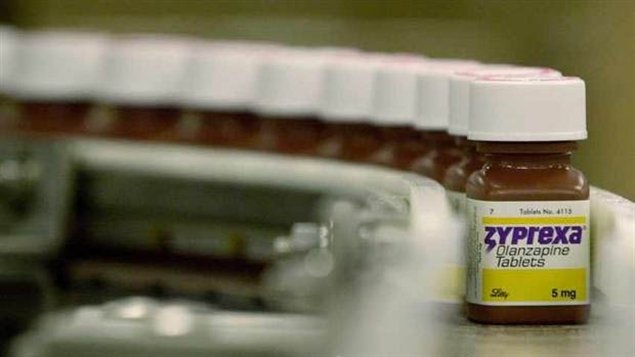US drug giant Eli Lilly claims Canada unfairly terminated its patents on two of its best selling drugs.
Late last week the company filed a half-billion dollar lawsuit under Chapter 11, the investor-state dispute settlement process, of the North American Free Trade Agreement. (NAFTA).
Lilly ‘s suit is in relation to the 2010 Canadian court-ordered invalidation of its patents for the ADHD drug Strattera. six years before it was due to expire, and Zyprexa, an anti-psychotic drug used to treat schizophrenia, although that patent expired in April 2011. Lilly merged to the two cases and is seeking $500-million in damages .
In earlier separate challenges launched by a generic drug manufacturer against the patents, Canadian courts said Lilly’s drugs did not fulfil the implied “inventive promise” of the patent — that is, it did not do what the inventor said, or implied, it would do when it applied for the original patent.
In the Strattera ruling the judge found that the clinical trial used to demonstrate the drug’s utility was “too small and too short in duration to provide anything more than interesting but inconclusive data.”
The judge hearing the Zyprexa patent challenge found that the drug did not meet the implied promise Eli Lilly made that the drug is markedly superior to other drugs for the long-term treatment of schizophrenia.
Under Canadian patent rules, a drug’s usefulness must be demonstrated or soundly predicted as of the date the patent application is filed.
Outside observers also view the case as unique because Eli Lilly is not directly challenging Canadian patent law, which by most accounts is very similar to U.S. law, but rather how Canadian judges have interpreted the law.
Doug Norman, Eli Lilly’s “Patent decisions in Canada over the last decade not only fly in the face of long-established international standards, but they’re subjective and completely unpredictable,”
However, Richard Gold, a patent law professor at McGill University, said Eli Lilly has no grounds for its case.
“To me this is frivolous and vexatious and should really have never been put forward,” he said.
Gold dismissed the company’s assertion that Canada is unique and out of step with international standards, noting that Australia and New Zealand use similar patent rules, while the United States and Britain use different rules.”, he said.
“There are no set of international norms. Many of us would like there to be international norms because it would make life a lot easier, but they don’t exist,” he said.
Observers also note that the case demonstrates the drawbacks to dispute resolution mechanisms being proposed in other major trade deals like the 12 nation Trans Pacific Partnership, which included Canada and the US, as well as other international trade deals..
On its website, the Council of Canadians quotes its trade campaigner Stuart Trew, “A win or settlement with Eli Lilly would be so harmful to our democracy, and set such a dangerous international precedent, that this NAFTA case cannot be allowed to proceed. In fact, it should trigger a radical rethink of these investor ‘rights’ treaties before the government is allowed to ratify new treaties and trade deals with China (FIPA), the European Union (CETA) or in the Trans-Pacific Partnership,” (TPP)
Canada’s Department of Foreign Affairs, Trade and Development said Friday it was assessing the notice of arbitration.
“Our government’s actions will continue to reflect our commitment to ensure Canadians continue to have access to the affordable drugs they need, while promoting innovation and job creation,” spokeswoman Caitlin Workman said in a statement.







For reasons beyond our control, and for an undetermined period of time, our comment section is now closed. However, our social networks remain open to your contributions.